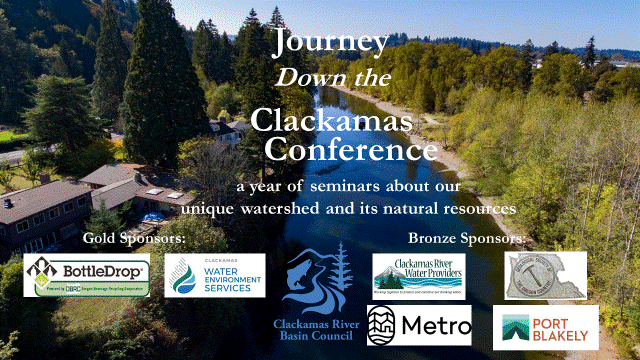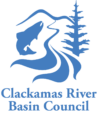The Clackamas River Basin Council is pleased to present:

About the Conference:
On March 9, 2021 the Clackamas River Basin Council launched a year-long series of free seminars about our unique watershed and its natural resources, from the river’s birth in alpine springs to its confluence with the Willamette River.
Subjects ranged from geology, water quality and forestry to fish, recreational, cultural and public policy issues. The series consists of 33, one-to-two hour sessions, taught by local and internationally-recognized experts.
The Clackamas provides drinking water to more than three hundred thousand humans who live and work in suburban Portland and is a resource, classroom and playground for tens of thousands more, including conservation professionals, anglers, rafters, boaters and other outdoor enthusiasts as well as timber producers, nursery farmers, agricultural landowners and many others.
| Date & Time | Seminars | Content | Suggested Prereq. | Speakers |
| 3/9/21 6:00pm |
WATER1: Intro to the Clackamas River Watershed (Event Recording) | An introduction to the basin, including stakeholders and users, key concerns and how you can get involved | None | Cheryl McGinnis, Executive Director, Clackamas River Basin Council & David Bugni, Board Member, CRBC |
| 3/23/21 6:00pm |
GEOLOGY1: An Introduction to Western Oregon Regional Geology (recording) | Geologic overview of the western Cascades | None | Sheila Alfsen, Portland State University |
| 4/6/21 6:00pm |
GEO2: An introduction to the Lower & Upper Clackamas River Basin: Geology and Earth Resources (recording) | Geologic overview of the lower and upper Clackamas River Basin | None | Clark Niewendorp, Geological Society of the Oregon Country |
| 4/20/21 6:00pm |
GEO3: Geologic Hazards in the Clackamas River Basin (recording) | Geologic hazards from rock falls and landslides to seismic issues. | GEO1 | Charlie Hammond & Brent Black, Cornforth Consultants |
| 5/4/21 6:00pm |
GEO4: The Soils of the Clackamas River Basin (recording) | Soils of the basin – common types, how they originated and what they can support | GEO2 | Katie Chambres, Natural Resources Conservation Service |
| 5/18/21 6:00pm |
AGRICULTURE1: Agriculture within the Clackamas River Basin (recording) | An overview of agriculture in the basin | None | Mike Bondi, OSU Extension |
| 6/1/21 6:00pm |
CLIMATE1: Clackamas River Basin Climate (recording) | Weather & climatology, projected changes in temperature, rain and snow through 2050/2100, climate and land use change impacts on water quality and water quantity, current and future fire risk, potential basin adaptation & mitigation strategies |
None | Paul Loikith, Andy Martin, Max Nielson-Pincus, Junju Chen, Andrés Holz, Portland State University |
| 6/15/21 6:00pm |
GEO6: Hydrology, Geomorphology and Stream Processes (recording) | GEO6: Geomorphology and Stream Processes of the Clackamas River Basin | GEO4 | Peter Wampler, Grand Valley State University |
| 6/29/21 6:00pm |
GEO7: Hydrology, Geomorphology and Ecology (recording) | GEO7: Interactions of Geomorphology and Ecology of the Clackamas River | GEO6 | Mike Cole, Cole Ecological, Inc. |
| 7/13/21 6:00pm |
FORESTRY1: Historic, current and future tree species distributions, forest types & forest stressors within the basin (recording) | Forested areas within the basin, how have forests changed over the millennia and stressors to, or within, our forests | None | Steve Acker, John Kim, & Holly Kearns, US Forest Service |
| 7/27/21 6:00pm |
FOR2: The importance of forests along streams (recording) | Extents (by species, age class and geographic distribution) and benefits of riparian areas and canopy cover. | FOR1 | Glenn Ahrens & Jon Souder, OSU Extension |
| 8/10/21 6:00pm |
FOR3 Wildlife in the forest (recording) | An overview presented of mammals, birds, reptiles and amphibians that frequent the forests in the basin. The interconnection of wildlife in the forest and their relationships to the forbs, shrubs and trees also will be discussed as well as wildlife conservation measures. | FOR2 | Claudine Reynolds, Port Blakely Tree Farm |
| 8/24/21 6:00pm |
FOR4 Wildfires in the Clackamas River basin (past & present) (recording) | History of wildfire in the basin, mitigation strategies (community and individual levels). Post wildfire assistance for landowners & communities | FOR1 | Matthew Reilly & Becky Flitcroft, US Forest Service |
| 9/7/21 2:00pm |
FOR5: Effects of climate change on forests in the basin and projected wildfire intensity and frequency (recording) | What do current models say and how should we better prepare our community and surrounding forestlands? | FOR4 | David Peterson & Jessica Halofsky, University of Washington |
| 9/21/21 6:00pm |
FOR6: Benefits of the Clackamas River basin’s forests: from enjoyment and resource to carbon storage (recording) | Economic benefits of wood and non-wood forest products and forest recreation in Clackamas River basin. Other benefits of forests | FOR1 | Glenn Ahrens, OSU Extension & Bonny Glendenning, Port Blakely |
| 10/05/21 6:00pm |
NAT1: Native American Focus on First Foods and Importance of Healthy Water (recording) | Throughout the conference series, presentations provide the story of Clackamas River’s evolving social, ecological and economic history. This session will focus on Native American presence and care for the Basin and including a focus on First Foods and the importance of water quality. | None | Jeremy FiveCrows, Columbia River Inter-Tribal Fish Commission |
| 10/19/21 6:00pm |
FISHERIES1: How clean is the water? An introduction to the water chemistry of the Clackamas River basin (recording) | An overview of the main chemical constituents in surface waters. How are constituents related to one another and what do they tell us about the waters in the basin? Publication list available here. | None | Kurt Carpenter, US Geological Service |
| 11/02/21 6:00pm |
FIS2: Stream Food Webs and Energetics in the Clackamas River (recording) | Gain a better understanding of interspecies relationships (from algae, insects and freshwater mussels to fish and mammals), Food web dynamics, and how do these things change seasonally & spatially across our watersheds? | FIS1 | Patrick Edwards, Portland State University |
| 11/16/21 6:00pm |
FIS3 Anadromous fish, trout and lamprey species (past and present) within the Clackamas River basin (recording) | A description of the primary native salmonid, trout and lamprey species present in the basin, historical context (fish species distributions and abundances). Migration patterns of each species. A description of the primary non-native or invasive fish species present and their interactions with native species. | FIS2 | Ris Bradshaw, Clackamas River Basin Council Board of Director, Forrest Foxworth, & Michael Hayworth, ODFW |
| 11/30/21 2:00pm |
FIS4: Habitat capacity, restoration potential and other factors considered in fish habitat restoration (recording) | Linking habitat capacity and restoration potential, high intrinsic potential, habitat requirements and the importance of cold water. Limiting factors common in the Clackamas River basin. | FIS3 | Nick Ackerman, Portland General Electric |
| 12/14/21 6:00pm |
FIS5: Overview of fish hatcheries in the Clackamas River basin (recording) | Update on fish hatcheries: The current hatchery genetic management plan – What is the role of hatcheries now and in the future? What has worked/not worked? (link to presentation) Also fish introductions and historical hatchery activities in the Clackamas Basin 1875-2000 from a retired fish biologist. |
FIS2 | Ben Walczak, Michael Hayworth, OR Dept of Fish & Wildlife (ODFW), & Doug Cramer, retired PGE Fish Biologist |
| 12/28/21 2:00pm |
FIS6: Interactions and behaviors of native and hatchery-reared fish (recording) | Opinion on hatchery and native fish genetics and probable impact on the survival of targeted species. Genetic differences and what they mean. | FIS5 | Ian Courter, Mt Hood Environmental, & Maureen Kavanagh, BPA |
| 1/11/22 6:00pm |
FIS7: Fish field surveys – what are they telling us? (recording) | Spring Chinook spawning distribution and population update for the upper Clackamas River. What are current bull trout, salmon, steelhead and lamprey ODFW spawner and juvenile snorkeling surveys telling us? Update on adult and juvenile passage at PGE’s hydro-complex. | FIS4 | Luke Whitman & Steve Starcevich, OR Department of Fish & Wildlife (ODFW) |
6:00pm |
CANCLELLED: FIS8: Historic and probable current and future effects of human development & population growth, fishing, dams and hatcheries on the Clackamas River basin | Impacts to date: The 4 Hs (harvest, hydropower, hatcheries (see FIS4), habitat). What does it take to maintain healthy populations of fish (salmon & trout) and lamprey species? | None | Garth Wyatt, PGE, Ben Walczak, ODFW |
| 2/8/22 6:00pm |
FIS9: An introduction to stream restoration and protection practices for the landowner (recording) | Man-made restoration measures (appropriate for the landowner): Fish passage barrier removals and replacements, road modifications/removals, water quality improvements, removal of non-native plant species and replacement with native plant species. Funding possibilities.(Reference list available here.) | FIS3 | Dave Stewart, ODFW, Dave Bugni, CRBC Board of Directors |
| 2/22/22 6:00pm |
FIS10: Fish habitat restoration effort successes, the ODFW STEP program and restoration partnerships (recording) | Update on restoration efforts in streams. Update on the ODFW STEP program. Important partnerships in stream restoration and outreach | FIS3 | Jon Cox, ODFW, and Cheryl McGinnis, Clackamas River Basin Council |
| 3/8/22 2:00pm |
FIS11 Advanced stream restoration and protection practices – natural river design approach (recording) | Human-made restoration measures: placements of engineered log jams, boulders & spawning gravels, construction of channel modifications. Urban placements and their effectiveness. | FIS3 | Brian Bair, USFS, and Geoff Hales, McBain & Associates |
| 3/22/22 2:00pm |
FIS12: Advanced stream restoration and protection practices – biological aspects (recording) | Biological aspects: biological response to wood placements. Limitations of artificial placements, effects of stream size. |
FIS3 | Bruce Zoellick, USFS |
| 4/5/22 6:00pm |
FIS13: Wetlands and beavers (recording) | Biological: An introduction to beavers. Physical: landslides, windfalls, wildfires | GEO7 | Kyla Zaret, PSU Institute for Natural Resources & Michael Krochta, BARK |
| 4/19/22 2:00pm |
FIS14: Large-scale restoration plans within the Clackamas River Basin (recording) | Clackamas Partnership Strategic Restoration Action Plan and other locally-created, related, current plans. Update on the Aquatic Conservation Strategy (ACS) of the federal Northwest Forest Plan. How resilient is the basin and its watersheds to fish population recovery? | FIS12 | John Runyon, Cascade Environmental Group, |
| 5/3/22 6:00pm |
FIS15: Economic Investments & Biological Response in the Clackamas River Watershed (recording) | Economic studies of the effectiveness of restoration strategies (large wood, boulders, spawning gravels, fish passage). Fish habitat models. | FIS14 | Geoff Hales, McBain & Associates, and Tim Shibahara, PGE |
| 5/17/22 6:00pm |
HRS1: Community-based science in the Clackamas Basin: the contributions of amateur scientists to managing streams in the watershed (recording) | The principles supporting, and benefits of, community-based science will be presented, focusing on some of the work currently being conducted in the Clackamas River Basin along with the data, findings and recommendations resulting from monitoring efforts. | WAT1 | Patrick Edwards, PSU, Gail Shaloum, Water Environment Services and member of the CRBC Board of Directors, Glenn Ahrens, OSU Extension, and Dave Bugni, member of the CRBC Board of Directors |
| 6/14/22 6:00pm |
HRS2: Policies providing success in the Clackamas River Basin and a look to future policies (recording) | Update on the successes and failures of public policy (local, state and federal levels) regarding the protections of threatened fish species within the basin as well as other protections of threatened flora and fauna that affect riparian areas. Socioeconomic implications of any policy recommendations | HRS1 | Jan Lee, Oregon Association of Conservation Districts, Tom Byler, Oregon Water Resources Department, Jim Brick, Oregon Department of Fish & Wildlife, and Representative Jeff Reardon, District 48 |
Previous Conference Presentations:
Press:
- Oregon City News
- Estacada News
- Lake Oswego Review
- The Tigard Times
- West Linn Tidings
- Clackamas Review
